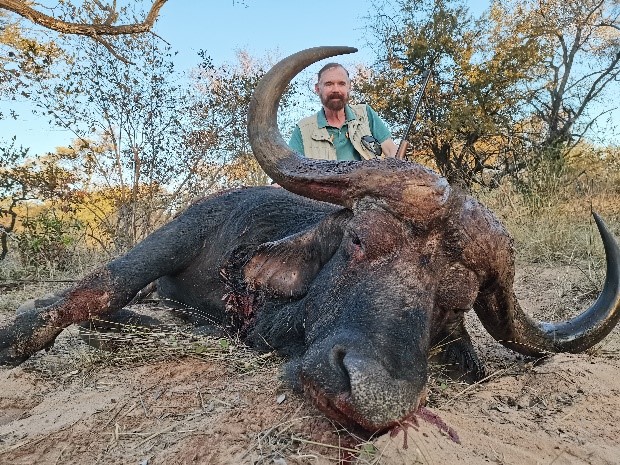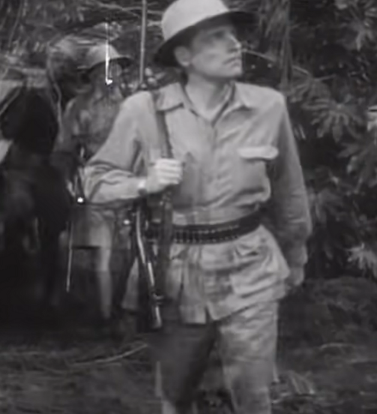Safari in South Africa, the Ultimate Hunting Experience (Part One)
Timothy J. Weber Ed. D.
Like many my age, I grew up watching Tarzan films where in the “Great White Hunter,” accompanied by a plethora of native bearers, would trek for days thru the bush, encountering numerous animals. They set up tent encampments with all of the luxuries of home. These fictional accounts were not too far off the reality of safaris in the late 19th and early 20th centuries. Teddy Roosevelt killed 512 animals during a 1909-1910 safari sponsored by the Smithsonian Institute (Edwards, 2016). Ernest Hemingway went on a safari in 1933 that was financed by his wife’s wealthy uncle, resulting in his novel “The Green Hills of Africa” (Palin, 2021). Not having any sponsors or wealthy relatives who were eager to part with their fortunes, I always thought that a safari was not in my future. I was dead wrong.
In 2018, I met Gary Pleasants, the United States representative of Adansonia Safaris, who was manning a booth at the Nation’s Gun Show in Chantilly, Virginia. He explained that an African safari was less expensive than a hunting excursion to the western US for bear or elk. The cost of airfare is $1,400 for a round trip from Dulles, Virginia. Package deals for a seven to ten day hunt are in the $4,000 to $7,000 range and allow the hunter to take several exotic plains game animals, as a package or selected individually from a comprehensive list. Food, lodging, laundry, ground transportation, and the services of a professional hunter, tracker and skinners are included in the cost. Big game hunting (elephant, rhinoceros, leopard, lion and Cape buffalo, known as the big five) costs are more substantial as a Cape buffalo bull or a lioness may cost $9,000 dollars or more.
Hunting in Africa is totally different from that in the United States. Here a hunter is on his own to decide if he will take an animal. This leads to a philosophy of “If it’s brown, gun it down” among some deer hunters. In Africa, hunting is conducted on farms such as that owned by Adansonia Safaris and its network of nearby farms to provide the hunter with over 100,000 acers of hunting land. A professional hunter (PH) oversees the hunt. It is his responsibility to choose which animal will be taken. By selecting older males who are no longer reproducing, they ensure the continued health and sustainability of the herd. American deer hunters use scent suppressive clothing, sprays, soap, laundry detergent and dryer sheets. This is all seen as worthless in Africa. There, wind is the key. If you are downwind of the animal, he will smell you and bolt, period. The African PH’s take extreme care to ensure that a stalk is not threatened by changing wind. If the wind shifts they will simply abandon the stalk. Hunting regulations also differ dramatically. Shooting across a road could get you in trouble in the U.S., but in Africa the road belongs to the farm owner, and animals on it make for a great long range shot. Hunting over bait is unacceptable in most cases in the U.S., however, leopard is always hunted at night over a fresh carcass.
In Africa, the hunt begins by getting in the back of a purpose built pickup truck that will take you to the hunting area. The back of the truck is equipped with seats facing forward and a padded frame that supports the hunter’s rifle. Driving down the dirt roads the PH or his tracker spot tracks bisecting the road and can begin a stalk or turn a corner and come upon an animal that is on the hunter’s list to be taken. A quick shot from the vehicle is used to put him down, allowing older hunters and those physically unable to stalk their prey to continue to participate in hunting. When shooting from the ground, the PH will place a bipod or tripod at shoulder height for the hunter. Known as the “sticks,” this steady platform, combined with a scope, all but guarantees success. Hunters having difficulty in locating the specific species that they desire to hunt may call for air support. The “Adansonian Air Force” consists of a single drone operated by the cameraman, Manu Goiko, and is used to identify animals and move them to the hunter. These methodologies would be frowned upon by the Department of Natural Resources Police in many states in the U.S. but, are the norm in Africa. Basically, the American hunter must let go of his concepts of hunting in order to enjoy the African hunting experience.
Lodge
The modern safari is unlike those of yesterday in that there are no more camping expeditions into the bush. Adansonia Safaris provides a heated room with a private bath that rivals most hotels. Wi-Fi service is available without additional cost. The staff treats the guests like kings. The food is excellent, as the finest cuts of meat from the animals taken are served for lunch and dinner. The typical dinner consists of sable steaks grilled over an open fire, kudu and gemsbuck stew, Cape buffalo burgers, blesbuck lasagna or bush pig, plus salad, vegetable and a potato dish, plus a decadent desert. Coffee, soft drinks, wine and beer are included and spirits are also available. There is daily laundry service, so a minimal amount of clothing is required for a ten day stay.
The author may be contacted at drtimweber74@gmail.com, or you may meet him and Gary Pleasants at the Adansonia Safaris table at the Nations Gun Show in Chantilly, Virginia on 19-21 November 2021. Gary may be contacted at (434) 566-1444.



